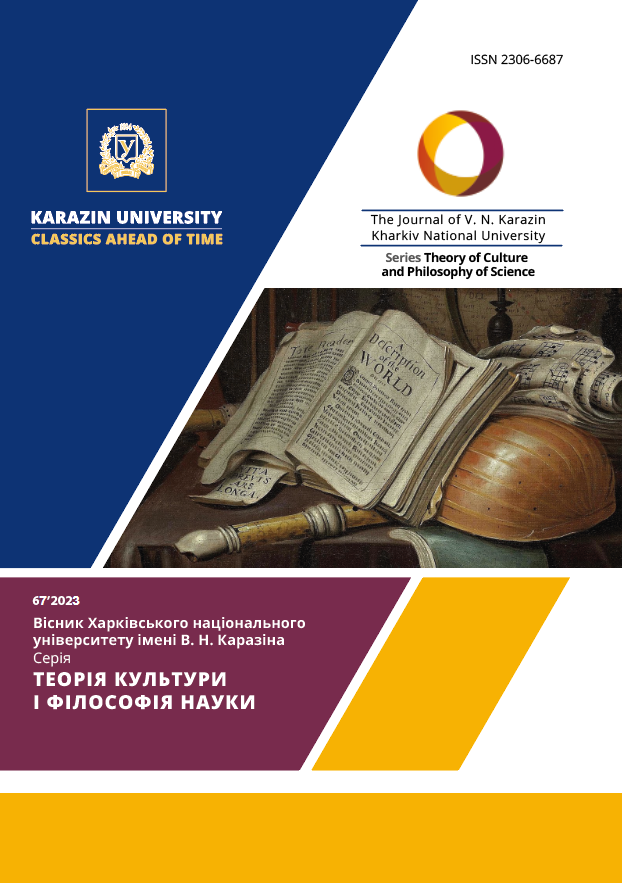ПАТІЯ ТА ЕТИКА
Анотація
В статті робиться аналіз важливості патичного (від патос/пафос), тобто чуттєво-логічного світосприйняття для етики. Актуальність дослідження патичних станів в етичному контексті обумовлюється недостатньою розвиненістю термінології в цій сфері а також складним та багатогранним зв’язком етики з емоціями. Метою статті є представлення та аналіз концепту патії та його значущості для етики. Завданнями статті є доведення, що розуміння патичності може бути корисним для етичних теорій. Патія в тому значенні, яке ми представили в роботі, не віддаляє людину від істини, а наближає її до пізнання себе та навколишньої дійсності через свою суб’єктність. Стани душі не просто впливають на наші рішення та формують нашу психіку, а демонструють, що індивід мислить почуттями. Така ситуація здається парадоксальною, проте в реальному мисленні людини складно відділити раціональне зерно від його емоційного забарвлення. Водночас патія є не тільки емоційним забарвленням – конотацією, а і формує денотат. Почуття заохочують до мислення та спрямовують увагу на певний конкретний елемент думки. Патія пов’язана з центром мислення та дії, а не тільки керується психікою. Стан людської психіки впливає на етику, але цей вплив може відбуватись по-різному. Патичний вплив на етику не може обмежуватись концепцією емотивізму, тому що не можна вважати, що всі наші етичні переконання повністю залежать від тих емоцій, які вони викликають у індивіда. Етика має свою унікальну сферу, яку не можна пояснити психофізичним детермінізмом, а етика емотивізму не дає достатніх підстав вважати себе єдиною теорією, яка спроможна дати відповіді щодо складних відношень патії та етики. Отже концепт патії має велике значення для екзистенціалізму, волюнтаризму та емотивізму, а також інших етичних теорій. Як висновок потрібно констатувати, що патія індивідуальна, хоча ми можемо виокремити її закономірності та соціальний вплив. Патія не заперечує логіку – патія створює наратив, з якого з’являється і мислення, і логіка, і наука як продукт людської творчості. Патія може виявитись тим, що заповнює прогалину, поєднує етику та психологію, але не на засадах еклектизму, а на засадах сучасної філософії: як етики, так і гносеології.
Завантаження
Посилання
Baumeister A. Bilia dzherel myslennia i buttia. Vybrani filosofski etiudy. Kyiv: Dukh i litera, 2012. 480 s.
Berhson A. Tvorcha evoliutsiia; per. z frants. R. Osadchuka. Kyiv: Vyd-vo Zhupanskoho, 2010. 318 s.
Huserl E. Idei chystoi fenomenolohii i fenomenolohichnoi filosofii. Per. z nim. V. Kebuladze. Kharkiv: Folio, 2020. 348 s.
Datsiuk S. Moment fylosofyy. Kyev: Nyka-Tsentr, 2013. 280 s.
Yevropeiskyi slovnyk filosofii: leksykon neperekladnostei / pid red. B. Kassen; per. z frants. Tom pershyi. Kyiv: Dukh i Litera, 2011. 576 s.
Kant I. Estetyka. Krytyka estetychnoi zdatnosti sudzhennia; per z nim. B. Havryshkiva. Lviv: Avers, 2007. 360 s.
Kant I. Krytyka praktychnoho rozumu; per. z nim. I. Burkovskoho. Kyiv: Yunivers, 2004. 240 s.
Kozlovskyi I. Ekzystentsiinyi intelekt: kurs lektsii. Elektronnyi resurs «Bila kava». Rezhym dostupu: https://www.youtube.com/watch?v=hnjvULGlr5g&list=PL4tEj-67A02M9B17ettlbf2Q8d75GfJ-J Data zvernennia: 27.11.23
Liutyi T. Nitsshe. Samoperevershennia. Kyiv: Tempora, 2017. 976 s.
Medytatsii Dekarta u dzerkali suchasnykh tlumachen: Zh.-M. Beisad, Zh.-L. Marion, K.S. On-Van-Kun; per. z frants. i lat. Kyiv: Dukh i Litera, 2014. 368 s.
Sapolski R. Biolohiia povedinky: prychyny dobroho i pohanoho v nas; per. z anhl. O. Liubenko. Kyiv: Nash Format, 2021. 672 s.
Spinoza B. Etyka; per. z lat. Kyiv: Androum, 2020. 210 s.
Fuko M. Nahliadaty y karaty. Narodzhennia viaznytsi; per. z frants. P. Tarashchuka. Kyiv: Komubook, 2020. 452 s.
Yunh K. Arkhetypy i kolektyvne nesvidome; per. z nim. K. Kotiuk. Lviv: Astroliabiia, 2013. 588 s.
Yaspers K. Psykholohiia svitohliadiv; per. z nim. O. Kysliuka, R. Osadchuka. Kyiv: Yunivers, 2009. 464 s.
Kierkegaard S. Concluding Unscientific Postscript; trans. from Danish by A. Hannay. Cambridge University Press, 2009. 584 p.
MacIntyre A. Three Rival Versions of Moral Enquiry: Encyclopaedia, Genealogy, and Tradition. Notre Dame, Indiana: Univ. of Notre Dame Pr., 1994. 252 p.
Milbank J. The Radical Orthodoxy Reader. London: Routledge, 2009. 430 p.
Scheler M. Ressentiment; trans. from German, Schoken books, 1972. 201 p.




